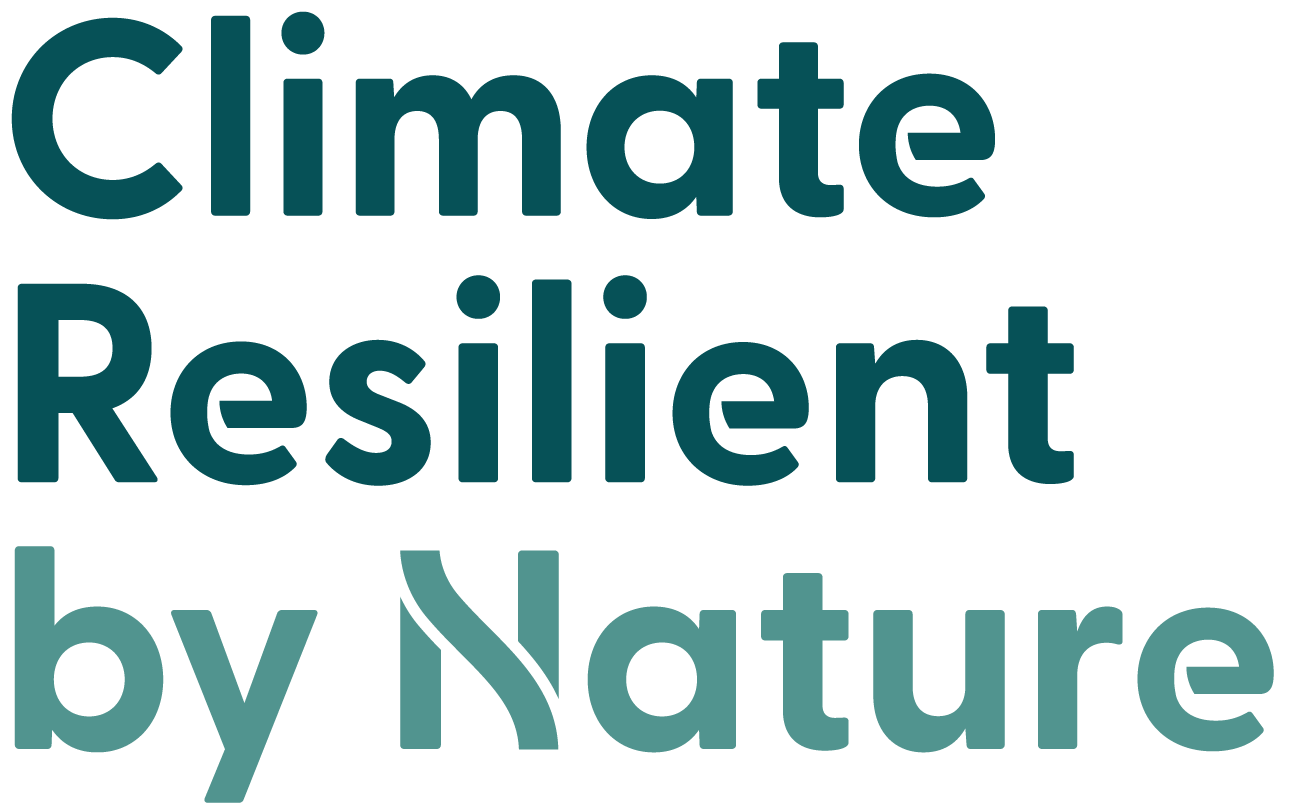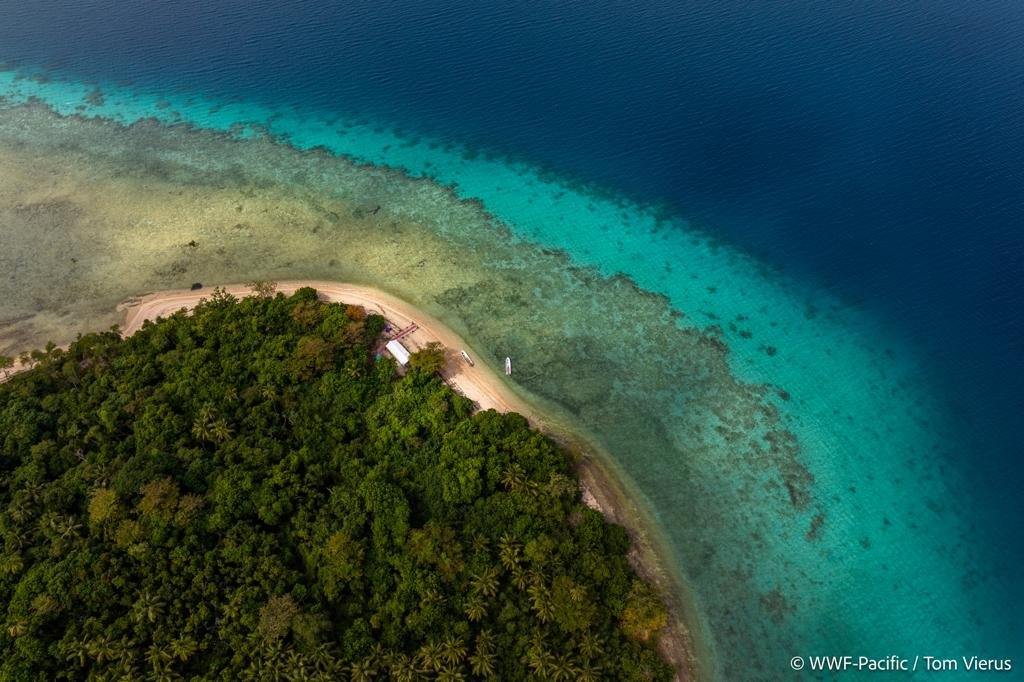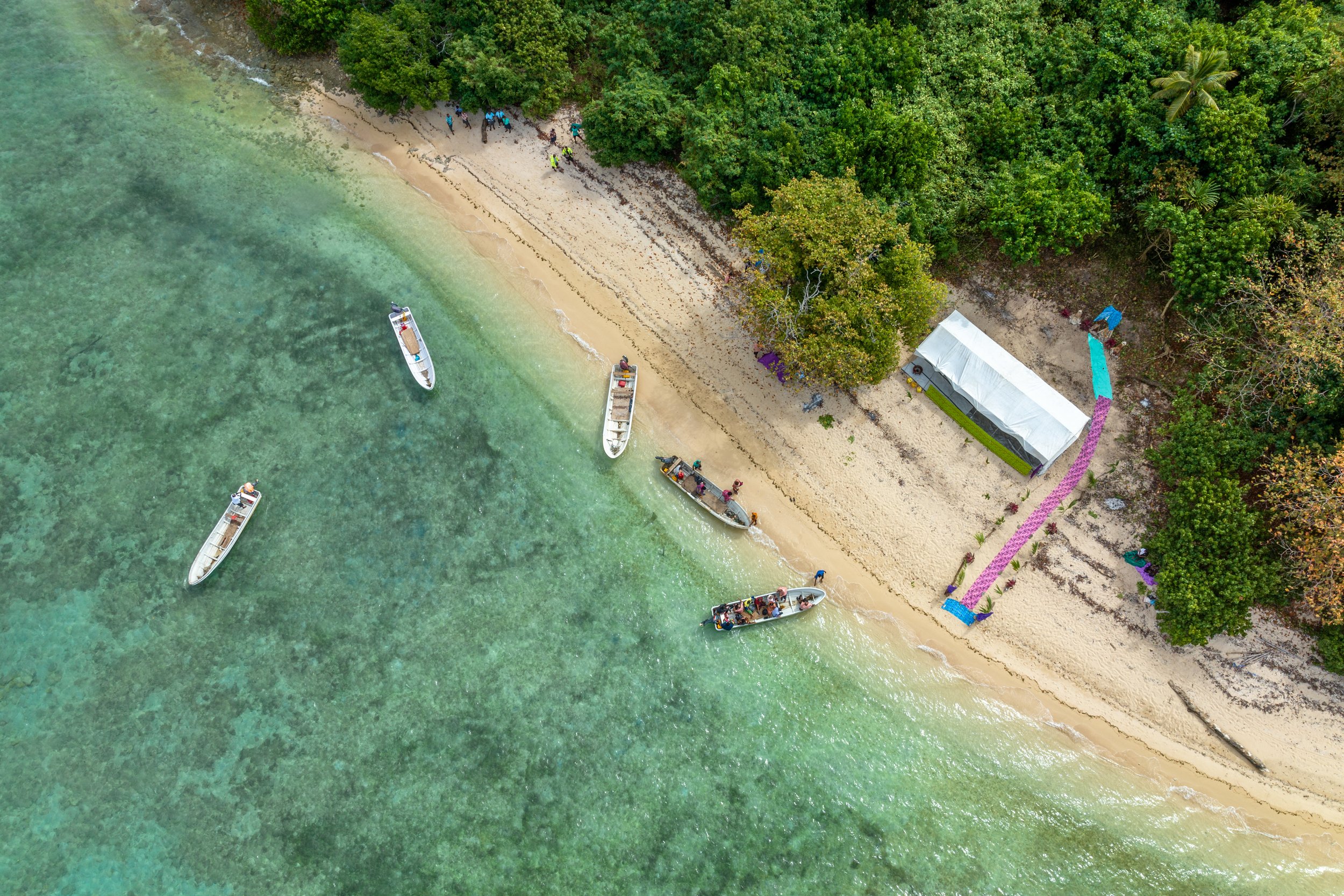Weaving traditional knowledge and conservation practice in Fiji
Nukuvadra Island, Fiji, home to a diverse array of marine life © WWF-Pacific / Tom Vierus
This project is supported by Climate Resilient by Nature (CRxN), an Australian Government initiative in partnership with WWF-Australia. CRxN supports nature-based solutions that restore and protect critical ecosystems, build sustainable livelihoods, and increase resilience to climate shocks.
Macuata Province in the north of Fiji is home to the Cakaulevu – the Great Sea Reef with its thriving diversity of marine life. But faced with a variety of threats including climate change and overfishing, fish stock in this area has dwindled over the past decade.
By combining their local culture and ancestral knowledge with formal protection, Kavewa community members are working together to build the resilience of their community and the ecosystem they rely on. And they’re already reaping the benefits…
The reef that provides
The Cakaulevu is the third-longest continuous barrier reef system in the world. Fiji's waters are some of the most biologically diverse in the world. Spanning over 200 sq. km. across four provinces, the area supports the livelihoods of up to one third of the country’s population that live adjacent to the reef system.
“We are very close to our environment and we fully depend on the resources,” said Emosi Time, a resident of Kavewa Island.
From paying schooling for the children to donating to the church, there is an endless list of day-to-day needs as well as cultural obligations to fulfil, and many look to the ocean for that.
“The land here doesn't support many crops so marine resources are crucial,” said Emosi.
Due to this, the community has a unique culture of only taking what they need. Here, women harvest inshore resources like mud crabs, mussels, shellfish and nama. Nama, or sea grapes are strings of green, tiny pearls of algae that are part of traditional cuisine in many Pacific Island countries. Women harvest about 25 kilograms each trip to barter or sell at local markets, which is often more than enough to cover their weekly expenses.
However, over recent years, Fiji has been on the frontline of overharvesting and climate change, which presents significant risks and impacts on food security and the health of marine areas in the long term.
For instance, coastal areas, which serve as vital spawning grounds and habitats for the marine life that many Fijian communities depend on are declining rapidly.
“For me, I’ve witnessed the decline in fish and also seen the impacts from use on our turtle population. My son will probably never see a loggerhead turtle. We used to have them when I was young but not anymore”
In addition, 1,135 hectares of mangroves – also crucial for fish spawning, food security as well as marine carbon sequestration – have been lost between 2001 and 2018, with tropical cyclones accounting for 77% of this damage. Poaching from neighbouring communities and fishermen from other islands has also contributed to a decline in fish stock.
Emosi Time at Katawaqa Island © WWF-Pacific / Tom Vierus
Weaving tradition and conservation practice
For generations, Fijians have implemented the sacred tabu, a temporary or indefinite closure of fishing grounds historically set to commemorate 100 days of a chief’s death. This also acts as an effective tool to sustainably manage natural resources.
Faced with the threat of a changing climate and its impacts on marine resources, community representatives from 10 villages gathered together to develop plans for improved management of reefs and mangroves. From the consultation, it was decided to integrate the traditional conservation practice of tabu with the formal declaration of a 70-hectare Community Protected Area (CPA) around Nukuvadra and Katawaqa. These two islands are key mangrove habitats and also nesting sites for endangered hawksbill turtles.
As part of the consultation process, a request was made by the women of Kavewa to keep areas where they harvest key inshore marine resources – particularly sea grapes – out of the tabu zone due to the important income they generate and existing management practices which have created sustainable stocks.
“[Natural resource] management has always been part of our culture. We’ve been taught these practices from our forefathers so it’s nothing new to us. However, we’re learning new things about species and [new methods] that we can put together with our traditional culture.””
To commemorate the decision, a ceremony was held incorporating religious, traditional and government elements – three key aspects of Fijian society.
“The Tui Nadogo [paramount chief of the Nadogo District] led the traditional way of setting up the tabu with the presence of the traditional leaders of the district and the head of the Nadogo and Nubu Methodist Church Circuit and an Assistant Minister. A lovo [a pit traditionally dug as an underground oven to cook a special feast] was prepared and a word of prayer from the church pastor, to signify the tabu,” said Ema Kanailagi, one Kavewa community member who attended the event.
Ensuring the CPA was set up with the backing of the church, traditional governance structures and the government has resulted in strong compliance, support and respect of conservation rules - particularly when compared to previous protected areas which suffered from extensive poaching.
“Things have changed since we went through the traditional and religious protocols of setting up this protected area, as compared to previous managed areas set up by our clan leaders,” said Ema.
Left to right: Community members arrive for dedication; Prayers with the Tui Nadogo, Ratu Ilisaniti Malodali; Ema Kanailagi, a Kavewa communit member who attended the event. © WWF-Pacific / Tom Vierus
Tabu, today and tomorrow
Fisherman, Donasio & Terita with their catch © WWF-Pacific / Tom Vierus
Combining the cultural significance and emotional connection of the tabu with the structured, participatory regulatory mechanisms of the CPA is key to building resilience for Fijian communities to mitigate and adapt to the impacts of climate change, overfishing and other challenges coming their way. The benefits, including more resilient food systems, enhanced livelihood opportunities, and increased knowledge of conservation practice, are already being experienced.
“A lot of mullet, we now witness huge schools of them and even baby sharks,” said Emosi Time who grew up on Kavewa. “We can see the positive outcome from our Marine Protected Area.”
“I went with the volunteers from WWF and we even took pictures of baby sharks. There were hundreds of them, so we can see it’s a positive outcome of our CPA.”
“Last week, fishermen from the village caught a lot of [mullets] right in front [of Kavewa Island], so it shows us the spillover from our CPA,” Emosi added.
Nama or seagrape areas, although outside the protected area, are also further benefiting from the healthier, more pristine ecosystem enabled by the CPA. Women have observed that nama now grows back faster after harvesting, helping to further ensure the resilience of this critical food source and income-generating activity.
Building a more resilient future
In tandem with the CPA, alternative livelihood opportunities for communities that combine tradition with conservation practice are also being explored. This includes Siga Damu, a social enterprise focused on sustainable farmed sea cucumber harvesting that utilises a traditional Fijian Vanua governance structure. This prioritises inclusive community decision-making and benefits and distributes income equitably to its shareholders.
With its growing demand and market price, wild sea cucumber stocks are being depleted. Siga Damu is developing new ways to farm sea cucumbers in pens near the protected sites to reduce reliance on wild stock while promoting sustainable management practices. As sea cucumbers play a vital role in maintaining sediment levels, ensuring their stocks remain sustainable also supports broader ecosystem health. At the same time, sustainable management through Siga Damu has the opportunity to bring income, education and empowerment to communities.
“[Community members] were only focusing on what they had today – go fishing and come back – they had no other future plans for what tomorrow will bring or how best they can improve their standard of living. They need more consultation, more awareness, more getting together, trying to instil new ideas in their minds about how best they can do that using their resources.”
- Seru Moce, Co-chair of the Qoliqoli Cokovata Management Committee
Nature is our greatest ally in the fight against climate change. That’s why Climate Resilient by Nature, an Australian Government-funded initiative in partnership with WWF-Australia, is supporting high-integrity nature-based solutions in the Indo-Pacific. Nature-based solutions can restore and protect critical ecosystems, build sustainable livelihoods, and increase resilience to climate shocks.









